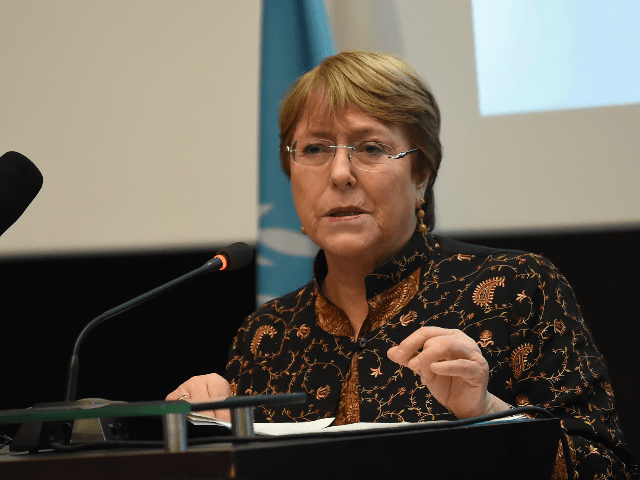Former president of Chile-turned-United Nations High Commissioner for Human Rights Michelle Bachelet arrived in Venezuela on Wednesday to meet with socialist dictator Nicolás Maduro and legitimate President Juan Guaidó.
“In my first visit to Venezuela as UN High Commissioner for Human Rights, I look forward to listening to all voices & working with all actors to promote and protect all human rights of all Venezuelans,” Bachelet wrote on Twitter. “I will make a statement on Friday, at the end of my visit.”
In my first visit to #Venezuela as UN High Commissioner for Human Rights, I look forward to listening to all voices & working with all actors to promote and protect all human rights of all Venezuelans. I will make a statement on Friday, at the end of my visit. pic.twitter.com/TWjEbYJJCi
— Michelle Bachelet (@mbachelet) June 20, 2019
In an appearance on state television, Maduro said he was ready to meet with Bachelet and hear how he could improve his socialist regime’s dire human rights records.
“We greatly anticipate her visit,” said Maduro. “It will be good for Venezuela’s system of human rights.”
Ahead of the visit, the regime freed 21 political prisoners and opposition activists, many of whom had been detained during anti-government demonstrations.
According to the Argentine news outlet InfoBae, Maduro also prepared for Bachelet’s visit by ordering a “clean-up” of the Heliocide prison facility in Caracas, where the country’s most high-profile political prisoners are being held. There have been countless reports of egregious human rights violations within the facility, including the torture of prisoners.
Bachelet is also due for a meeting with Guaidó, who continues not to control the presidential palace or the military despite being sworn into office in January. According to El Nacional, Guaidó is also urging people to take to the streets, expressing his hope that Bachelet “will verify the things we are denouncing.”
José Miguel Vivanco, Americas director for Human Rights Watch, urged Bachelet to insist on visiting prisons and the Rios Children’s Hospital in Caracas, which has reportedly become a waiting room for sick and dying children, rather than just meeting with regime officials for pre-prepared events.
“She can do that via Skype from Geneva,” he told France24. “She’s there to represent the victims. The litmus test is whether she can gain access to a prison of her choice, inspect conditions and meet in private with political prisoners. That’s the only thing that will give purpose to this trip.”
While President of Chile, Bachelet developed reasonably warm diplomatic ties with late dictator Hugo Chávez and the Maduro regime, sharing a similar left-wing ideology. In her new role, Bachelet issued a statement in February criticizing the Maduro regime for its brutal crackdown on protesters and reports of extrajudicial killings at the hands of security forces.
“The Venezuelan government must stop its forces from using excessive force against unarmed protesters and ordinary citizens,” she said. “People have been shot and killed, others have reportedly received wounds from which they will never completely recover, including losing eyes.”
“I am also concerned about increasing restrictions on freedom of expression and of the press in Venezuela, and the allegations that the authorities have arbitrarily used the law against hatred, adopted in November 2017, to prosecute journalists, opposition leaders and anyone expressing dissenting opinions,” she continued.
Bachelet also criticized the U.S. approach of imposing sanctions against the regime in a bid to weaken and ultimately oust Maduro from power, arguing that they were only worsening the country’s deep economic and humanitarian crisis.
“I am concerned that the recent sanctions on financial transfers related to the sale of Venezuelan oil within the United States may contribute to aggravating the economic crisis, with possible repercussions on people’s basic rights and wellbeing,” she said at the time.
Follow Ben Kew on Facebook, Twitter at @ben_kew, or email him at bkew@breitbart.com.

COMMENTS
Please let us know if you're having issues with commenting.